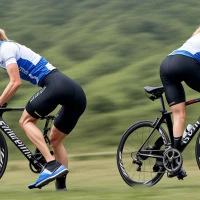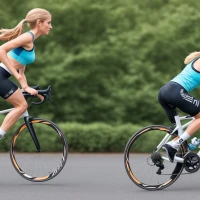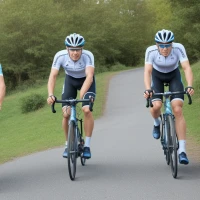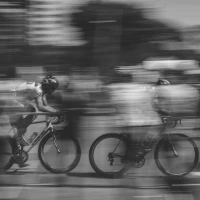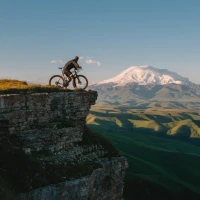Cycling is not just about the scenic routes and the wind against your face; it’s an all-encompassing workout that targets multiple muscle groups, especially your glutes. The promise of cyclist’s legs and a toned booty has motivated many to hop onto their bikes, pedal fiercely, and embrace cycling as their go-to fitness regimen. If you’re looking to enhance your lower body aesthetics or boost your gluteal strength, you might be surprised to learn that cycling is your secret weapon. Let’s dive deep into the world of wheels and find out how cycling can help sculpt your dream booty.
Cycling has long been celebrated for its cardiovascular benefits, but its potential for building a powerful posterior is often underrated. Whether you’re an outdoor trail enthusiast or a stationary bike devotee, integrating cycling into your fitness routine could be the game-changer you need for unlocking your best glutes. This article will explore how repetitive pedal pushing can lead to a firmer, more lifted backside, and why cyclists often boast the most coveted of curves.
Pedal Your Way to Perfect Glutes
The Gluteal Benefits of Cycling
air cycling benefits is an activity that predominantly uses the lower body muscles, and when it comes to shaping up those glutes, certain aspects of cycling make it an ideal exercise:
- Consistent Resistance: Each push of the pedal provides resistance, essentially functioning as a repetitive weightlifting session for your glutes.
- Targeted Muscle Engagement: The upstroke and downstroke of cycling engage the gluteus maximus, medius, and minimus.
- Adjustable Difficulty: Changing gears or terrain can increase resistance, further challenging your booty-building muscles.
Understanding Gluteal Muscles
Before we delve into how cycling uphill benefits can help with glutes, let’s understand the anatomy involved:
- Gluteus Maximus: The largest muscle in your body responsible for hip extension and upper thigh movement.
- Gluteus Medius: This muscle aids in thigh abduction and stabilizes the pelvis.
- Gluteus Minimus: Similar to the gluteus medius, it also helps with thigh stabilization.
These muscles work in concert during a cycling benefits on body workout, culminating in a comprehensive gluteal exercise.
Cycling Intensity and Its Impact on Glute Growth
Intensity matters when it comes to stimulating muscle growth. Here’s how cycling benefits health intensity affects your glutes:
- Low-Intensity Rides: Foster endurance in the gluteal muscles without significantly increasing muscle mass.
- High-Intensity Interval Training (HIIT) on a Bike: Boosts explosive power and can result in muscle hypertrophy, often leading to more defined glutes.
Crafting Your Cycling Routine
Beginner Bikers: Starting Off on the Right Pedal
For cycling newbies, the key is to begin at a comfortable pace and gradually build up:
- Start with flat terrains before tackling hills or inclines.
- Ensure your saddle height allows for a slight bend in the knee at the lowest pedal point, optimizing glute engagement.
- Focus on proper form, keeping your core engaged and pushing down on the pedals with your heels.
Intermediate to Advanced: Upping the Ante for Your Backside
Once you’re comfortable with a basic cycling machine benefits routine, consider these advancements:
- Incorporate Interval Training: Alternating between high-intensity sprints and lower-intensity recovery periods encourages strength and size development in the glutes.
- Add Inclines and Hills: These require more force, which activates the gluteal muscles even more.
- Resistance Training: Supplement your cycling with glute-specific exercises, such as squats or lunges, to support muscular growth.
Tips for Maximizing Glute Engagement on the Bike
To ensure your daily 10 km cycling benefits workouts are as effective as possible for targeting the glutes, follow these tips:
- Proper Bike Fit: Ensure your bike settings align with your body to activate the correct muscles.
- Mindful Pedaling: Concentrate on using your glutes to push down and pull up the pedals.
- Seat Positioning: A slightly higher seat can force more work onto the glutes, though it should never compromise comfort or safety.
Incorporating Cycling into Your Lifestyle for Glute Development
The Daily Commute: Cycling to Work and Beyond
Turning your commute into a cycling benefits for ladies routine can significantly impact your gluteal strength and shape. The daily consistency provides ongoing muscular engagement and growth.
Leisure Rides: Fun with Fitness Benefits
Weekend rides or leisurely cycling sessions after work are not just enjoyable; they’re also a stress-free way to keep those glutes in action without the gravity of an intense workout.
The Social Spin: Joining Cycling Groups or Classes
Engaging with a cycling community or participating in spin classes can provide motivation and a sense of camaraderie as you work towards your booty goals.
Cross-Training Strategies for Enhanced Results
Strength Training Complement
While cycling is fantastic for the glutes, balancing it with other forms of strength training can further sculpt and strengthen your muscles. Consider the following exercises:
- Deadlifts: They target the gluteus maximus for overall posterior development.
- Hip Thrusts: Focus on the entire glute complex.
- Resistance Band Workouts: Use bands to challenge your glutes in different planes of motion.
The Role of Diet and Nutrition
Muscle growth and definition also depend on your diet:
- Protein Intake: Essential for muscle repair and growth. Ensure you’re consuming enough protein post-ride.
- Carbohydrates: They provide the energy necessary for endurance and high-intensity cycling workouts.
- Healthy Fats: Consume omega-3 and omega-6 fatty acids to support overall muscle health.
Monitoring Progress and Adjusting Your Routine
Keep track of your fitness journey through:
- Regular measurements or photos of your gluteal development.
- Varying your cycling routines to avoid plateaus.
- Assessing the comfort and performance levels of your bike setup periodically.
Troubleshooting Common Challenges in Gluteal Development
Overcoming Plateaus
If you’ve hit a plateau in your glute development, it’s essential to alter your routine. Increasing the intensity, adding new exercises, or changing your diet can reignite progress.
Addressing Muscle Imbalances
Ensuring proper form and muscle activation during cycling can prevent over-reliance on dominant muscle groups and foster balanced growth.
Preventing Injury
Maintain your body’s wellness to stay consistent with your cycling:
- Stretching: Employ dynamic stretching pre-ride and static stretching post-ride.
- Proper Recovery: Incorporate rest days and consider massage or foam rolling to support muscle recovery.
Signing Off: Embrace the Journey to Your Best Glutes
Cycling can be a substantial component in achieving your gluteal goals. It’s an exercise that not only benefits your overall health but also sculpts and strengthens your lower body, contributing to the envy-inducing shape many cyclists exhibit. With consistency, the right approach, and an understanding of how cycling impacts your gluteal muscles, you can pedal your way to a dream booty.
By integrating various cycling routines, strategically cross-training, and maintaining a balanced diet, you can maximize the gluteal benefits cycling offers. Whether it’s through daily commutes, leisure rides, or social spin sessions, make each pedal count towards sculpting your best glutes.
Remember, a stronger, firmer backside isn’t just about appearance—it’s about empowerment, performance, and the joy of challenging your body in new, exciting ways. Embrace cycling not only as a sport or a pastime but as a viable and enjoyable pathway to unlocking your best glutes. Keep riding, keep pushing, and may the road ahead lead you to your dream booty.



